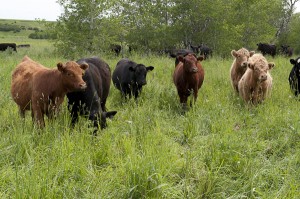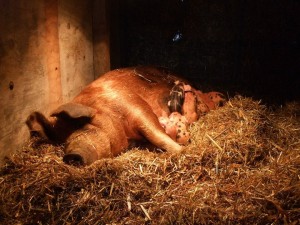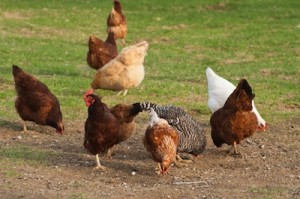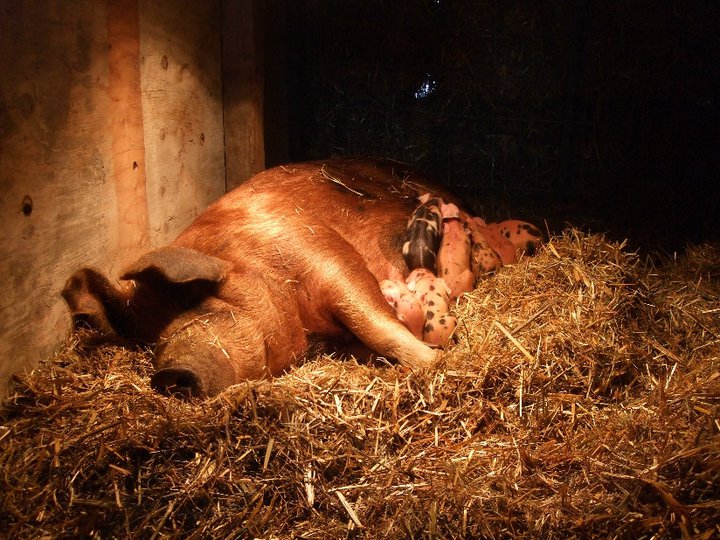
It’s spring, and this year is no exception to the rule of new beginnings. We’re spring cleaning, rearranging furniture, and recycling old belongings. But these past few weeks have brought more than just outward changes… I’m turning inward, and ultimately I’ve thrown out old ideas for a new set of values. In a way it’s been happening gradually for months, ever since I vowed to educate myself about good food. But sometimes it takes something bigger; a single event to push a person into change, like turning a switch. And I felt it the other day when I was reading a book.
It’s not uncommon for me to get emotional over a book. Jonathan Safran Foer is one of my favorite authors, and his novels deal with themes of loss, grief, memory. They’re funny, but heartfelt, and after each cathartic cry I’d wash my face and turn back to the real world. But this time he wrote a work of nonfiction: Eating Animals.

Without abandoning his unique writing style, Foer tackled the subject of factory farming. After being an off-and-on vegetarian for years, he felt compelled to research the tradition of eating meat after the birth of his first child. Food is a powerful medium for sharing beliefs and values; what traditions would he pass on to his son by eating meat? By avoiding it?
One of the very first truths Foer arrives at: to talk about eating animals today is to talk about factory farming. He goes on to detail the current state of meat production and the implications it has for the future. While many of us are blissfully unaware, factory farming has already had a staggering effect on our health and the environment. Add to that toll the issue of animal rights, and it’s difficult to see why so many continue to accept (and in doing nothing, actively support) this farming system… all for the simple pleasures of taste.
I read Eating Animals over the course of a few days. It too brought tears, but no release; the story he described is one I’m living in. The reality left me disgusted, enraged, and incredibly sad. The torturous conditions in warehouses where animals are kept and brutalities of slaughterhouses are just the beginning.

The price we all pay for readily available and affordable meat is more than any reasonable person would accept if they knew the real cost. How did we come to this state of disconnect, and how can we begin to make it right?
It was at first difficult to swallow Foer’s assertion that his book is not an outright argument for vegetarianism. After all, the book is an account of the research that led him to choose a vegetarian lifestyle. His biases are clear from the start, but he also gives voice to the individuals he met along the way – they’re presented not as interviews, but as stories in themselves. I read personal accounts from a factory farmer, an animal rights activist, a slaughterhouse worker, a vegetarian cattle rancher, and even a vegan working to design a slaughterhouse.
Their perspectives were a welcome contrast to Foer’s intense discourse. They reminded me that we don’t have to let factory farming divide us along lines of whether or not we eat animals. The choice to avoid meat altogether and the choice to support ethical meat operations ultimately have the same objective: to eliminate the wrongs caused by factory farming.

Still, there is (unsurprisingly) a lot of controversy surrounding Foer’s book. Certainly there are matters left unaddressed – the ways in which we use animals other than for their meat, for one. And there were a few moments where I questioned the author’s intention. But at its heart Eating Animals is just another story, and the best stories are those that make a lasting impression. For me, the story didn’t end when I closed the book. It’s intertwined with my own story now, and with every decision I make about meat from now on.
For the past two weeks I’ve gone from a selective omnivore to very selective, teetering in on the brink of vegetarianism. I’m not sure yet which way I’ll fall, but I’ve made a few important decisions to ground me for the time being. One thing is for certain, and this book made it painfully clear to me: meat matters. To what extent does it matter? It’s a complex and personal question that each of us must decide for ourselves. If you’re looking for answers, Eating Animals is a good place to start.
________________________________________
For more vegetarian recipes, visit Natural Born Baker, Kate’s blog.
Photo credits: cattle, chickens – ©Ken Kailing; pigs – Crown S Ranch; spring rolls – ©Kate Hilmer

